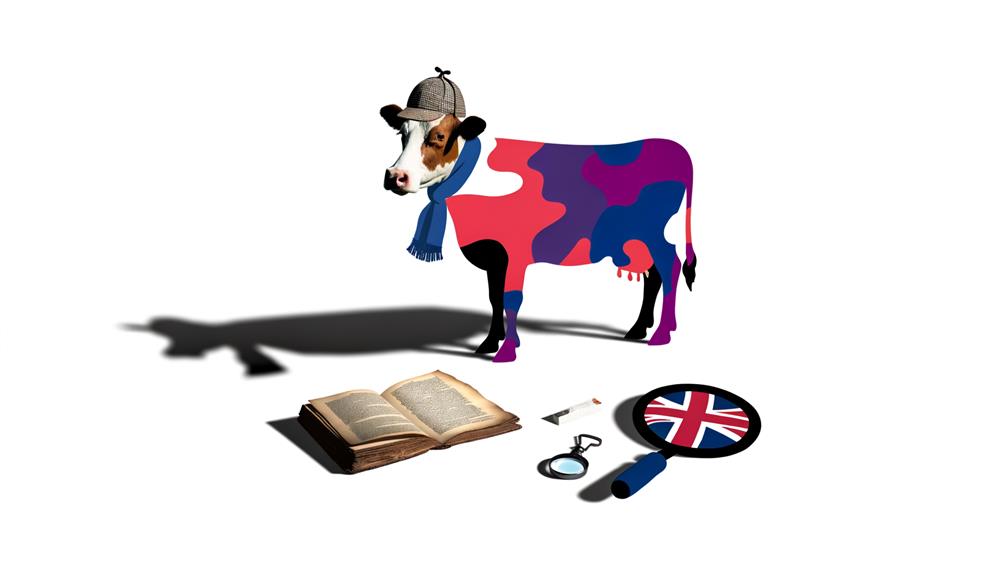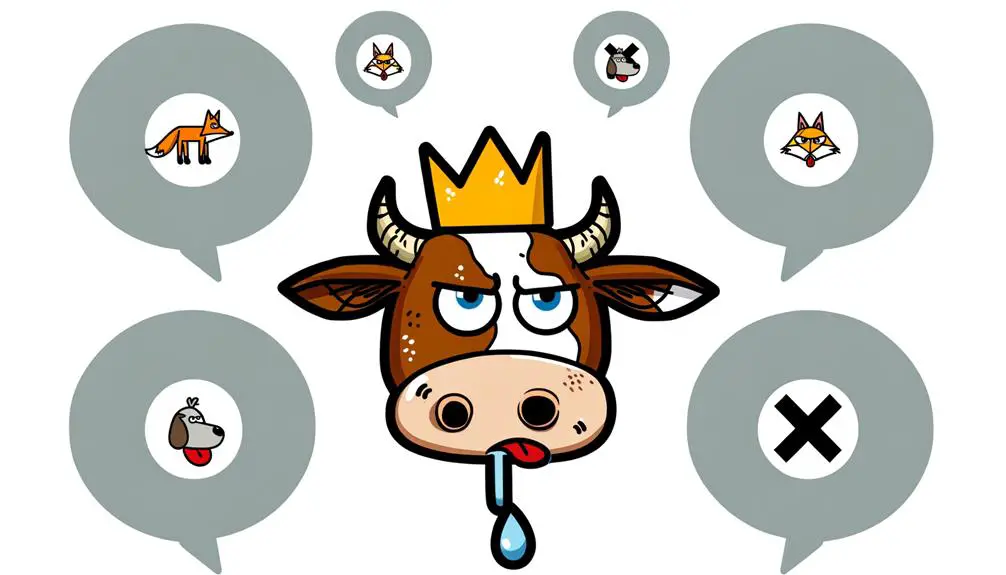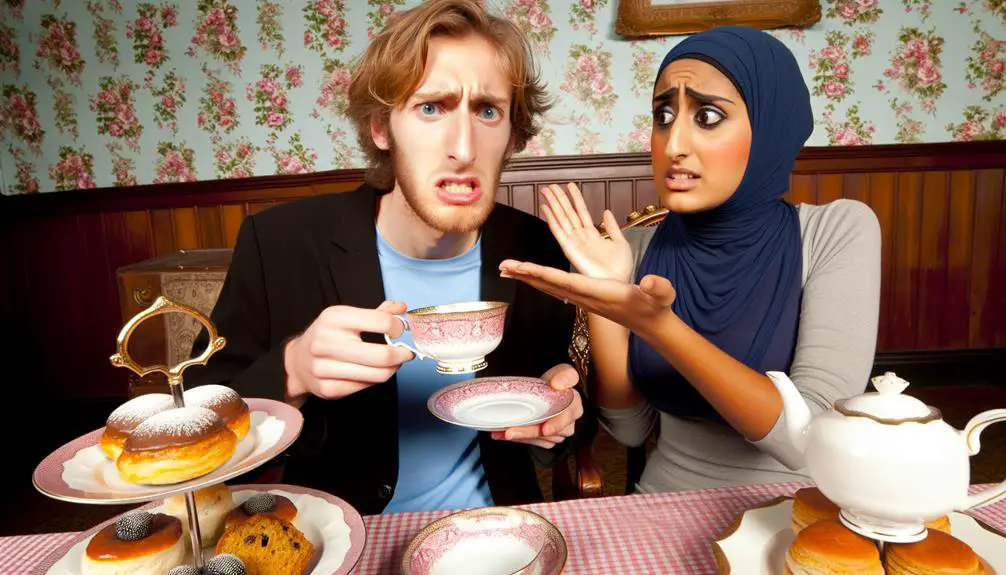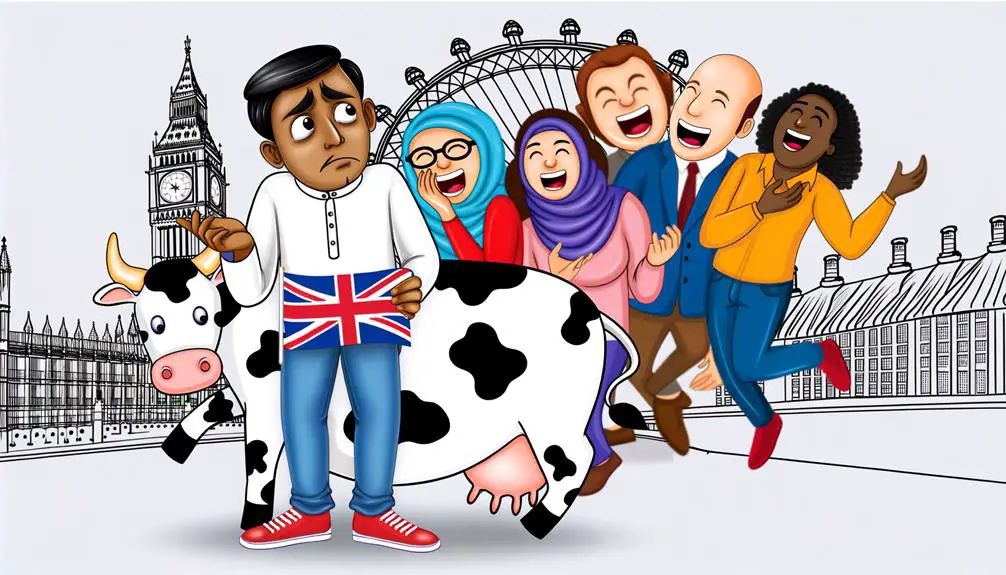In British slang, when you're called a 'cow,' it's not a comment on your similarities to farm animals. Instead, this term packs a punch with negative connotations, steeped in cultural and societal attitudes. Over the years, 'cow' has evolved from its literal meaning to become a flexible insult or a playful jab among friends, reflecting deep-seated societal values and perceptions. Its meaning can shift from an affectionate tease to a sharp critique, depending on tone and context. This linguistic flexibility highlights the rich, nuanced layers of British slang. As you explore further, you'll uncover how 'cow' mirrors broader societal dynamics and interactions.
Key Takeaways
- In British slang, 'cow' is often used pejoratively to describe a person, typically a woman, in a negative manner.
- The term can imply that someone is annoying, unpleasant, or difficult to deal with.
- 'Cow' has evolved in language from its literal meaning to acquire these negative connotations in social interactions.
- Despite its generally negative usage, 'cow' can also be used playfully or affectionately among close friends.
- Understanding the context and tone is crucial, as it can significantly affect how the term is perceived and received.
Origins of 'Cow' in Slang

Delving into the origins of 'cow' in British slang, you'll find it's steeped in a rich linguistic history that reveals much about societal attitudes and cultural shifts. The journey of 'cow' from its literal animal etymology to a slang term is a fascinating example of linguistic evolution. Initially, the term simply referred to the domesticated bovine. However, as language evolved, so did the meanings ascribed to 'cow'.
The transformation of 'cow' into slang didn't occur overnight. It was the result of centuries of linguistic adaptation, influenced by changing social norms and attitudes. Historically, the term began to take on negative connotations, moving beyond its neutral animal reference. This shift is reflective of the broader patterns of language change, where words accumulate new meanings based on their usage in different contexts.
Understanding this change requires examining the layers of language and how words can shift in meaning based on societal influences. The etymology of 'cow' as slang is a clear illustration of how language reflects the changing values and perceptions of a society. It's a display of the dynamic nature of linguistic evolution, showing how even the simplest of terms can develop complex meanings over time.
General Meaning in British Culture
In British culture, 'cow' has evolved to become a term that's often used pejoratively, reflecting complex societal attitudes towards behavior and character. This evolution is deeply rooted in both cow symbolism and cow etymology, painting a picture of how language adapts and morphs over time to convey nuanced social commentary.
| Aspect | Description | Impact on Language |
|---|---|---|
| Cow Symbolism | Traditionally linked to fertility and patience in many cultures but often seen as docile and compliant in a derogatory sense in modern British slang. | Shapes the term's connotation to imply a lack of backbone or assertiveness when applied to individuals. |
| Cow Etymology | Derives from Old English 'cū', related to Dutch 'koe' and German 'Kuh'. The term has agricultural roots, emphasizing the domestic and unassuming nature of cows. | Influences the term's usage to denote someone seen as ordinary or unremarkable in character, sometimes with a negative twist. |
| Societal Attitudes | Reflects underlying societal attitudes towards certain behaviors or characteristics, especially those deemed as passive or subservient. | Reinforces the term's pejorative use in critiquing behavior rather than merely describing it. |
Understanding the confluence of cow symbolism and etymology provides insight into why 'cow' has become a layered term within British slang, serving as a mirror to societal values and perceptions of behavior and character.
'Cow' as an Insult

You're now faced with understanding how 'cow' evolves from a simple noun to a complex insult within British slang. It's crucial to delve into its origins to grasp the depth of its impact on social interactions and dynamics. This exploration unveils not just the evolution of language, but also the nuances that shape interpersonal communications in the UK.
Origins of 'Cow' Insult
Tracing back to its roots, the term 'cow' as an insult in British slang reveals a complex interplay of cultural and linguistic shifts. When you investigate 'cow etymology', you'll find that its journey is as fascinating as the evolution of language itself. The linguistic evolution of 'cow' from a simple, neutral term referring to livestock to a slang insult is a proof of the fluid nature of language.
- Historical Context: Initially used in a purely animal-related sense, the term gained negative connotations over time.
- Cultural Influences: Shifts in societal attitudes and expressions of frustration or disdain contributed to its slang usage.
- Language Dynamics: The adaptability of English allowed 'cow' to develop into a term of insult, reflecting changes in social norms and values.
Impact on Social Interactions
Utilizing 'cow' as an insult greatly impacts social interactions, often undermining the respect and cordiality essential for effective communication. This term, deeply embedded in cultural perceptions, reflects a nuanced understanding of language evolution. The table below illustrates how the term 'cow' intersects with social dynamics:
| Aspect | Impact | Consideration |
|---|---|---|
| Cultural Fit | May be more acceptable in some cultures than others | Cultural sensitivity needed |
| Communication | Can lead to misunderstandings and conflict | Clarity and intent |
| Relationships | Potentially damages rapport and trust | Awareness and repair |
In your interactions, it's important to recognize the power of words. 'Cow', while seemingly benign, carries weight in social contexts, influencing perceptions and relationships. Understanding its implications can enhance communication, fostering a more inclusive and respectful dialogue.
Playful Uses of 'Cow'
In exploring the playful uses of 'cow' within British slang, you'll find it often serves as a tool for affectionate teasing among friends, indicating a level of comfort and camaraderie. It's also employed in humorous character descriptions, providing a light-hearted, yet sharp, critique of someone's behavior or personality. Finally, as light-hearted insults, its use showcases the nuanced balance between humor and affection in British social interactions.
Affectionate Teasing Among Friends
Among friends, calling someone a 'cow' can be a form of affectionate teasing, signaling a close relationship rather than genuine insult. This playful use reflects the nuanced layers of friendship dynamics and communication styles. It showcases:
- Flexibility in Language: Adapting slang for humorous, affectionate purposes.
- Understanding and Trust: Recognizing the intent behind the words as benign or endearing.
- Cultural Context: Grasping the subtleties of British slang within personal relationships.
This linguistic practice underlines the importance of context and mutual respect in friendships. It's a confirmation of how people can transform language, bending it in ways that reinforce bonds rather than break them. In the right settings, what might seem abrasive becomes a token of intimacy and camaraderie.
Humorous Character Descriptions
When you're dubbed a 'cow' in a lighthearted manner, it often paints a vivid, humorous picture of your character traits or current mood, reflecting the playful creativity inherent in British slang. This usage showcases the rich tapestry of animal comparisons entrenched in the language, where traits of various fauna are humorously attributed to human behaviors. The evolution of slang, particularly in the context of 'cow', mirrors societal shifts and the nuanced understanding of humor. By calling someone a 'cow', there's an intricate balance struck between mockery and affection, encapsulated within a single word. The precision of such slang terms serves not just as a linguistic tool but as a lens through which the dynamics of interpersonal relationships and social commentary can be observed, all while maintaining a light-hearted tone.
Light-Hearted Insults
Building on the humorous character descriptions, it's evident that referring to someone as a 'cow' can often serve as a light-hearted insult, encapsulating a complex mix of jest and critique within British slang. Within this framework, 'cow' is wielded with a degree of affection, signaling not deep-seated animosity but a playful jab among friends. This usage thrives on:
- Gentle mockery, transforming an otherwise harsh term into a term of endearment.
- Verbal sparring, where the intention is to tease rather than to harm.
- The creation of a shared linguistic culture that values wit and affectionate ribbing over genuine offense.
Essentially, when you're dubbed a 'cow' under such circumstances, it's less about insult and more about inclusion in a circle where verbal jousting is part of the camaraderie.
Regional Variations
In different regions of the UK, the slang term 'cow' can carry distinct nuances and connotations, reflecting the diverse linguistic landscapes. Through dialectal comparisons, you'll find that linguistic evolution plays a significant role in how the term is perceived and used. For instance, in some areas, 'cow' might be a mild insult, akin to calling someone silly or thoughtless. Yet, in other parts, it carries a heavier, more derogatory weight, often used to imply that someone is being unreasonable or unpleasant.
This regional variation isn't just a matter of semantics but is deeply rooted in cultural contexts and social interactions. In Northern England, for example, the term can sometimes be used in a more affectionate, teasing manner among friends, reflecting a different social dynamic than in Southern regions, where its usage might be perceived as more outright offensive. Understanding these nuances requires not only a grasp of the words themselves but an appreciation for the subtleties of regional dialects and the social norms that influence language use.
Thus, when you're exploring the UK's linguistic landscape, it's important to take into account the regional context in which 'cow' is used. This awareness enriches your understanding of British slang and highlights the intricate tapestry of the country's spoken word.
Reactions to Being Called a 'Cow'

Typically, reactions to being called a 'cow' vary greatly, often depending on the context and the relationship between the individuals involved. In British slang, where words often carry more than just their literal meanings, understanding the nuances behind such terms is important. The term 'cow' can be particularly layered, interwoven with cultural connotations and cow symbolism that might not be immediately apparent to outsiders.
When you're on the receiving end of this term, your response might be influenced by several factors:
- The tone and intention behind the use: Was it a playful jab among friends or a malicious insult from a stranger? The perceived intent shapes your reaction.
- Your personal emotional resilience: Individuals with high emotional resilience might brush off the term, recognizing it as a momentary expression of frustration or annoyance. Conversely, those with lower resilience might take the comment to heart, feeling deeply insulted.
- Understanding of cow symbolism: If you're aware that 'cow' can sometimes be used in a more affectionate, teasing manner, you might not take offense. However, without this cultural insight, the term could seem harsher.
In essence, your reaction to being called a 'cow' is a complex interplay of context, personal disposition, and an understanding of the underlying symbolism and intent.
'Cow' in Media and Literature
The portrayal of 'cow' in media and literature often reflects society's complex attitudes towards this symbol, offering insights that you might find both intriguing and enlightening. In cinematic portrayals, the cow often embodies themes of nurturing and fertility, yet it can also represent stubbornness or foolishness, mirroring the multifaceted nature of the term in British slang. Literary adaptations, on the other hand, explore deeply into the symbolic significance of the cow, examining its cultural and historical connotations through nuanced narratives.
| Medium | Insights Offered |
|---|---|
| Cinematic | Often showcases cows in pastoral settings, highlighting their role in human sustenance and culture. |
| Can portray cows as comic elements, reflecting their perceived stubborn or clumsy nature. | |
| Literary | Uses cows to symbolize fertility, motherhood, or earthiness in various narratives. |
| May explore the cow's sacred or taboo aspects in different cultures, providing a broader perspective. | |
| Adaptations | Transforms the cow's symbolism to suit modern contexts, sometimes challenging traditional views. |
Understanding these portrayals requires an analytical mind, as you're exploring through layers of cultural symbolism that have evolved over time. The cow's depiction in media and literature serves as a mirror to society's shifting values and perceptions, offering a rich tapestry of meaning that goes beyond its immediate connotations in British slang.







